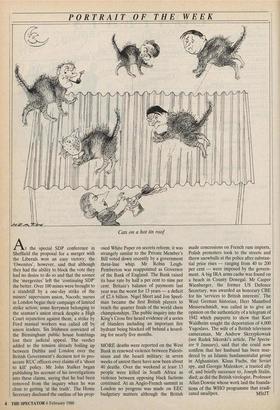PORTRAIT OF THE WEEK
Cats on a hot tin roof At the special SDP conference in Sheffield the proposal for a merger with the Liberals won an easy victory; the `Owenites', however, said that although they had the ability to block the vote they had no desire to do so and that the sooner the `mergerites' left the 'continuing SDP' the better. Over 100 mines were brought to a standstill by a one-day strike of the miners' supervisors union, Nacods; nurses in London began their campaign of limited strike action; some ferrymen belonging to the seaman's union struck despite a High Court injunction against them; a strike by Ford manual workers was called off by union leaders. Six Irishmen convicted of the Birmingham public house bombings lost their judicial appeal. The verdict added to the tension already boiling up between Dublin and London over the British Government's decision not to pro- secute RUC officers over claims of a 'shoot to kill' policy. Mr John Stalker began publishing his account of his investigations into these claims, saying that he had been removed from the inquiry when he was close to getting 'at the truth'. The Home Secretary disclosed the outline of his prop- osed White Paper on secrets reform: it was strangely similar to the Private Member's Bill voted down recently by a government three-line whip. Mr Robin Leigh- Pemberton was reappointed as Governor of the Bank of England. The Bank raised its base rate by half a per cent to nine per cent. Britain's balance of payments last year was the worst for 13 years — a deficit of £2.6 billion. Nigel Short and Jon Speel- man became the first British players to reach the quarter finals of the world chess championships. The public inquiry into the King's Cross fire heard evidence of a series of blunders including an important fire hydrant being blocked off behind a hoard- ing for nearly five months.
MORE deaths were reported on the West Bank in renewed violence between Palesti- nians and the Israeli military: in seven weeks of unrest there have now been about 40 deaths. Over the weekend at least 13 people were killed in South Africa as violence between opposing black factions continued. At an Anglo-French summit in London no progress was made on EEC budgetary matters although the British made concessions on French rum imports. Polish protesters took to the streets and threw snowballs at the police after substan- tial price rises — ranging from 40 to 200 per cent — were imposed by the govern- ment. A big IRA arms cache was found on a beach in County Donegal. Mr Casper Wienberger, the former US Defence Secretary, was awarded an honorary CBE for his 'services to British interests'. The West German historian, Herr Mannfred Messerschmidt, was called in to give an opinion on the authenticity of a telegram of 1942 which purports to show that Kurt Waldheim sought the deportation of 4,000 Yugoslays. The wife of a British television cameraman, Mr Andrew Skrzypkowiak (see Radek Sikorski's article, The Specta- tor 9 January), said that she could now confirm that her husband has been mur- dered by an Islamic fundamentalist group in Afghanistan. Klaus Fuchs, the Soviet spy, and Georgie Malenkov, a trusted ally of, and briefly successor to, Joseph Stalin, died; as did the British virologist, Professor Allan Downie whose work laid the founda- tions of the WHO programme that eradi-


















































 Previous page
Previous page